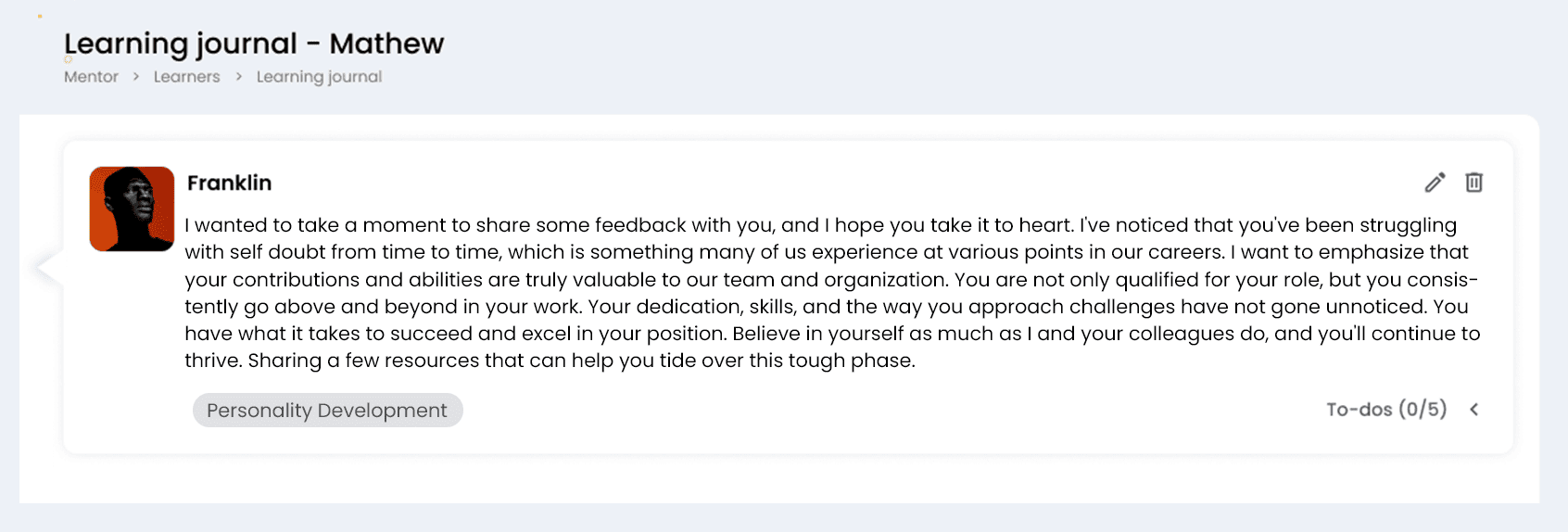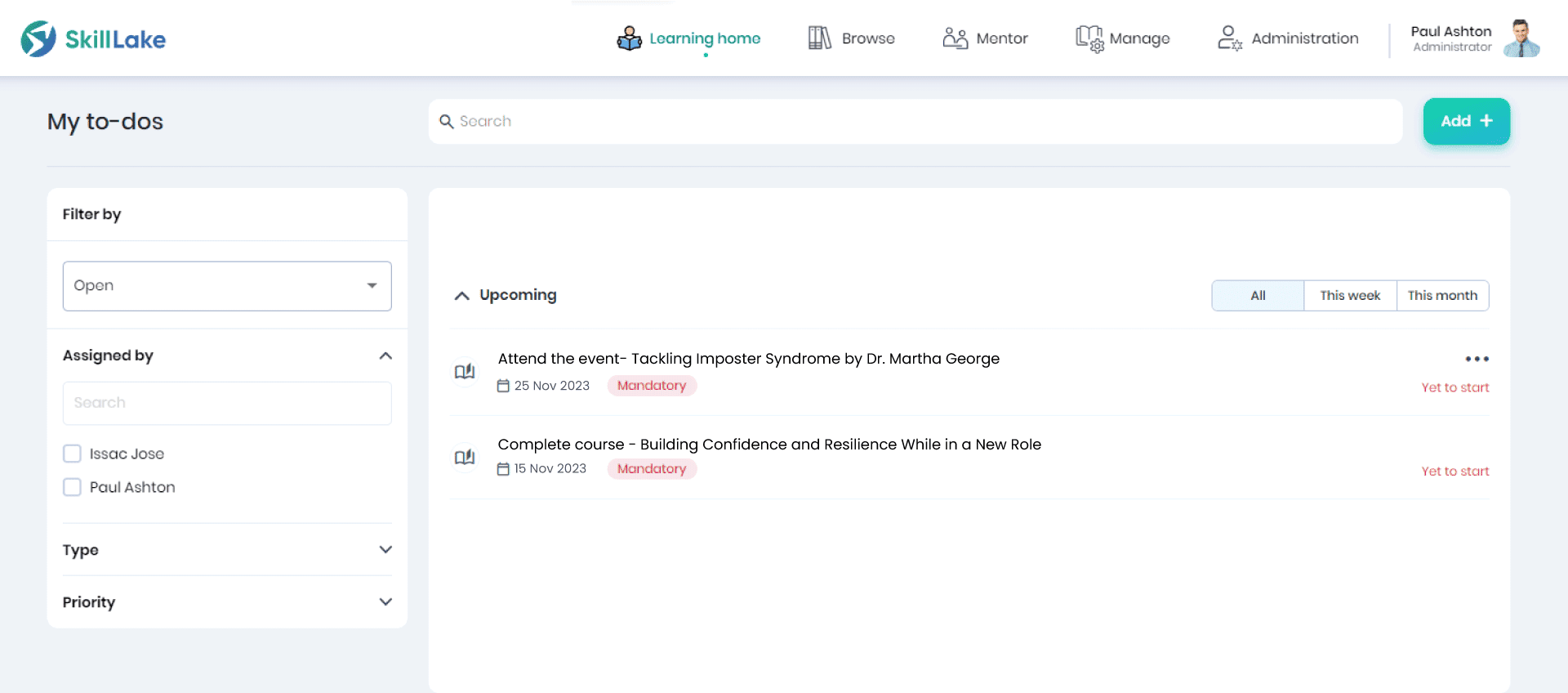The Role of HR in Tackling Imposter Syndrome

According to NerdWallet’s research, 78% of business leaders reported feeling imposter syndrome at work at some point in their careers. Despite the prevalence of this phenomenon among leaders, there is still a significant stigma associated with it. Only 21% of leaders have openly discussed these feelings with their peers or other business leaders, while a mere four percent choose to keep these emotions private.
Another survey conducted by the business communication provider Moneypenny among 2,000 U.S. workers found that 32 percent of respondents had experienced imposter syndrome in the workplace. According to the data, Imposter Syndrome is most commonly observed among individuals who are just starting their careers and those who are approaching retirement. The data highlights that starting a new role triggers Imposter Syndrome in most people (57%).
Furthermore, the research indicates that Imposter employees tend to contemplate leaving their jobs, with 59% of business leaders admitting to seriously considering such a move due to self-doubt. Additionally, this issue has a detrimental impact on professional relationships (64%), physical health (53%), financial well-being (51%), and personal relationships (46%).
Notably, imposter syndrome was highest among younger workers:
- 46 percent of workers aged 18 to 24
- 40 percent of those aged 25 to 34
- 31 percent of those aged 35 to 44
- 18 percent of those aged 45 to 54
- 19 percent of those aged 55 to 64
- 8 percent of those aged 65 and older
The Imposter Syndrome Institute underscored on its website that societal stereotypes linked to competence, which are based on factors such as gender, race, age, language, socioeconomic class, and disability, can significantly contribute to making certain groups more vulnerable to experiencing imposter syndrome.
Proactive HR intervention is indeed crucial for addressing imposter syndrome within an organization. Cultivating an open and supportive workplace culture is a crucial strategy to help employees overcome imposter syndrome, and encouraging honest conversations can play a significant role in this effort. By fostering an environment where individuals can openly share their struggles and receive constructive guidance, HR contributes to the overall well-being and success of employees and the organization.
What Is Imposter Syndrome At Work?
Imposter syndrome, initially identified and coined by clinical psychologists Pauline Rose Clance and Suzanne Imes in 1978, is characterized by individuals experiencing persistent feelings of anxiety and a lack of internal acknowledgment of their success despite demonstrable high levels of achievement in external, objective measures. This psychological phenomenon frequently leads individuals to perceive themselves as “frauds” or “phonies” and to doubt their competencies and capabilities.
Causes and Types of Imposter Syndrome
Imposter syndrome, a phenomenon more commonly experienced when individuals venture into new territories and face the pressure to achieve, was first explored by Clance and Imes. They posited that this mentality stemmed from a complex interplay of factors, including gender stereotypes, early family dynamics, cultural influences, and attribution style.
Key Factors Influencing Imposter Syndrome
-
Family Dynamics
Childhood experiences of family expectations, the emphasis on success and perfection can persist throughout an individual’s life.
-
Cultural Expectation
Diverse cultures place varying values on education, career, and success, shaping individuals’ perceptions of themselves.
-
Personality Traits
Perfectionism, a personality trait, is often the driving force behind imposter syndrome. Individuals relentlessly seek flawless achievements leading to anxiety and worry.
-
Comparison
The tendency to compare oneself with others, particularly in achievement, can lead to feelings of inadequacy.
Types of Imposter Syndrome
Dr. Valerie Young has categorized imposter syndrome into five distinct types:
-
The Perfectionist
This type is preoccupied with the “how” of doing things and tends to perceive even the smallest mistake as a failure.
-
The Expert
Individuals of this type constantly worry about what they know or can do, often feeling like failures if they have a minor knowledge gap.
-
The Soloist
This category places great importance on the “who” and believes that success should be achieved independently without seeking help from others.
-
The Natural Genius
Those falling into this category measure their self-worth based on how effortlessly and swiftly they accomplish tasks. They may feel ashamed if they require extra time or have to redo something.
-
The Superwoman/Superman/Super Student
These individuals evaluate their achievements by how many different roles they can juggle and excel in simultaneously.
How to Deal With Imposter Syndrome at Work?
-
Set Up Performance Goals and Regular Follow-Ups
Establishing clear performance goals and conducting periodic follow-ups are essential components of effective corporate imposter syndrome management. Implement SMART ( (Specific, Measurable, Achievable, Relevant, Timely) goals in collaboration with each team member. Incorporating SMART goals and a robust follow-up strategy into performance management can create a more supportive and nurturing environment that helps individuals build confidence and reduce imposter syndrome.
-
Develop a Feedback Culture
Fostering a feedback-centric culture is a powerful strategy for addressing imposter syndrome. Developing a deep understanding of your employees allows agile identification of their needs and challenges.Collecting feedback from the team helps HR and management identify employees who may be experiencing imposter syndrome. Constructive feedback is instrumental in overcoming imposter syndrome as it fosters a culture of continuous improvement.

-
Design an Employee Recognition Plan
An effective employee recognition plan is crucial for overcoming imposter syndrome. A structured framework for expressing appreciation and nurturing a positive workplace culture elevates employee morale. This plan helps employees feel valued and motivated, reducing feelings of inadequacy associated with imposter syndrome. It also fosters a sense of belonging and inclusivity, contributing to a more positive and productive work environment ultimately helping individuals overcome imposter syndrome and build confidence in their abilities.
-
Provide Mental Health Support
Prioritizing mental health is crucial in addressing imposter syndrome, as it equips individuals to manage emotions, boost self-confidence, and develop adaptive coping strategies. Organizations can contribute significantly by implementing Employee Assistance Programs (EAPs) and conducting Mental Health Awareness Training. EAPs offer confidential counseling and resources, creating a supportive workplace environment. Mental Health Awareness Training helps reduce the stigma around mental health and enhances employee understanding on mental health issues. Cultivating such an environment prioritizes the workforce’s well-being, fostering resilience and productivity.

-
Promote Psychological Safety
Psychological safety is essential for tackling imposter syndrome in the workplace. It fosters open communication, enabling employees to express their imposter syndrome concerns without fear. A supportive environment helps individuals gain insights into their thoughts and makes them more confident in their skills and abilities. In psychologically safe workplaces, employees realize they’re not alone in dealing with issues like self-doubt, negative self-perceptions, anxiety, and more.
-
Focus on Diversity, Equity, and Inclusion (DEI)
Promoting Diversity, Equity, and Inclusion (DEI) within an organization is crucial for creating a safe workplace. These strategies also help individuals combat imposter syndrome. Inclusive hiring practices and diverse interview panels reduce imposter syndrome during recruitment. DEI training addresses unconscious biases contributing to imposter syndrome and equips individuals to manage these feelings. Mentorship and sponsorship programs, particularly for underrepresented groups, boost confidence and counteract imposter syndrome by providing guidance and advocacy. Employee Resource Groups (ERGs) reduce isolation associated with imposter syndrome by creating a sense of community where experiences can be shared and support sought.
Conclusion
Imposter syndrome represents a pervasive challenge in professional settings, affecting individuals across various demographics. Organizations cannot underestimate its detrimental effects on individuals. However, by implementing effective strategies, they can mitigate its impact and foster a more positive and productive workplace environment.
Establishing clear performance objectives, promoting a feedback culture, and designing a comprehensive employee recognition plan are key steps in addressing imposter syndrome. These initiatives not only enhance employee motivation and confidence but also contribute to a more inclusive and supportive workplace culture.
It is essential to understand that imposter syndrome affects individuals differently, and a tailored approach is necessary to address its varied manifestations. By proactively addressing imposter syndrome, organizations can unlock the full potential of their employees, leading to increased productivity, satisfaction, and overall success in the professional sphere.
Build a culture of continuous learning with Skill Lake’s state-of-the-art people development platform. Give your employees professional training to help them excel in their job roles and propel your business to greater efficiency and success.
Start Today

Aarathy Jayakrishnan
Aarathy is an e-learning professional and enthusiast with a keen understanding of learning and development concepts. She writes insightful content, unraveling the possibilities that e-learning holds, and strives to make education open for all.